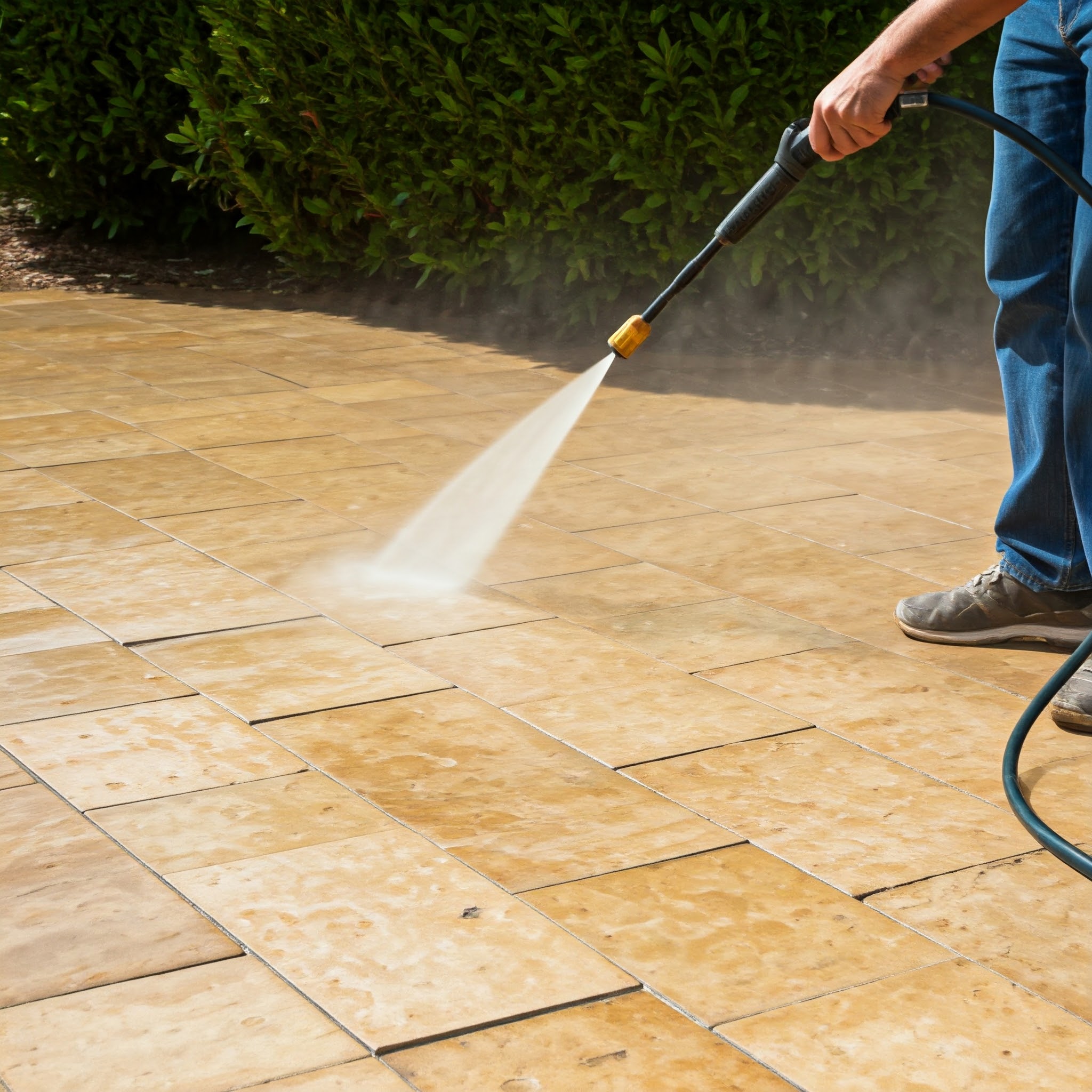Limestone pavers are an excellent option for your pool and outdoor area. The inherent beauty, structural integrity, and non-slip surface make limestone pavers a popular and much loved option.
But if you have limestone pavers around your pool, or anywhere else for that matter, knowing how to clean the stone surfaces in a way that maintains its beauty and integrity is critical.
Cleaning limestone pavers requires careful attention to maintain their beauty and integrity. Here are our top tips, including essential do’s and don’ts for effectively cleaning your limestone surfaces.
Understanding Limestone
Limestone is a sedimentary rock primarily composed of calcium carbonate. It is a highly popular stone for use in interior design, construction, and outdoor settings – such as pool pavers.
Limestone forms through various natural processes. The most common of these is the accumulation of organic materials, such as shells and coral, in marine environments. Over time and under pressure, these materials undergo compaction and cementation, resulting in the solid formation referred to as limestone today.
Limestone appears in various colours, such as white, beige, grey and even blue. The colouring, shading and patterns is influenced by the the level of ‘impurities’ in the stone, such as clay or iron oxide. But the most unique aspect of its aesthetic is caused by the fine-grained texture of the stone. While limestone ranges in smooth to rough textures, the grainy nature adds to its depth of aesthetic appeal.
Limestone is a durable material but is relatively soft compared to other rocks. This is good for cutting and shaping the limestone pavers into shapes for applications around your pool, but the porosity and softness does mean that you should take extra care in your ongoing maintenance of your limestone pavers so it looks and functions as wonderfully as possible.

Do's for Cleaning Limestone Pavers
1. Sweep regularly
Over time, limestone pavers can be subject to grime buildup. This is often caused by dirt, leaves and debris leaving stains and discolourations. By regularly sweeping your limestone pavers, you can remove this debris and ensure that the grime and staining does not have a chance to ‘take root’.
2. Use the right cleaners
When it comes to cleaning natural stone, especially limestone, not all cleaning agents are made equal. Always opt for a pH-neutral (non-acidic) cleaner. Many cleaning detergents are specifically designed for different types of stone. If you are able to source one that is designed for limestone that is ideal.
3. Mix and mop gently
Once you have your safe cleaning detergent, it is recommended that you mix it with warm, clean water before applying. This helps to both dilute the agent. Always use a soft and clean mop when cleaning the surface and do so gently.
4. Clean spills up quickly
The best way to stop your limestone from staining is to prevent it from getting stained! But spills do occur. When it happens, the quicker you can clean up the spill the better. Liquid spills left unattended have a greater chance of causing stains.
5. Blot, don’t wipe
As with all natural stone, limestone pavers should be cleaned through ‘blotting’. This means, instead of wiping up a spill and thereby spreading the liquid around, you blot or dab the spill with a soft and clean cloth to prevent the spread and potential damage.
6. Scrub gently
If your limestone pool pavers do get stained, you can use a soft brush or sponge and apply some gentle scrubbing. Avoid using a hard-bristled brush as these can scratch the surface quite easily.
7. Rinse the limestone pavers
Once you have applied the cleaning solution, always rinse the pavers off thoroughly with clean water. This removes any residue and minimises the likelihood of longer term damage or stain.
8. Dry your pavers
Dry mops or lint-free cloths are good ways to dry polished limestone surfaces. It can easily prevent watermarks from appearing or streaks. Even limestone pavers around pools should be dried where possible, especially if they are not exposed to direct sunlight.
9. Seal your limestone
Like most natural stone types, limestone benefits from regular professional sealing. Consider applying a penetrating sealer yourself regularly, but always engage a professional once every few years at least. This will protect your limestone pavers from stains and moisture damage.
Don'ts for Cleaning Limestone Pavers
1. Avoid acidic cleaners
Do not use any acidic cleaning agents. Whether vinegar, lemon juice or acidic chemicals, these substances can etch, damage and discolour the limestone pavers’ surface.
2. Avoid bleach and ammonia
Along with acidic cleaners, stay away from bleach or other ammonia-based cleaners. These harsh chemicals will damage your limestone pavers and discolour the aesthetic.
3. Avoid steel wool
Abrasive scrubbers, such as steel wool, can cause scratches and marks on the surface of the limestone. Only ever use soft bristled brushes or soft clothes and sponges when cleaning this natural stone.
4. Avoid pressure washing
While pressure washing can be used effectively on limestone, it is not recommended. High pressure can force the water into the very pores of the limestone and lead to erosion or damage over time. If you are going to use a pressure hose, make sure it is on the lowest setting.
5. Don’t leave it to dry
Limestone pool pavers will naturally dry but if you use any cleaning solutions, do not leave them to dry on their own. It could leave unsightly smudges and/or streaks that will be far more difficult to remove later.
For more tips, contact Euro Marble today
By following these do’s and don’ts, you can keep your limestone pavers looking as pristine as possible for as long as possible. Regular maintenance and careful cleaning not only preserves the stone’s beauty but also enhances its overall functionality for your outdoor spaces.
To speak to the experts of all things limestone pavers Sydney-wide, give the Euro Marble team a call today.





